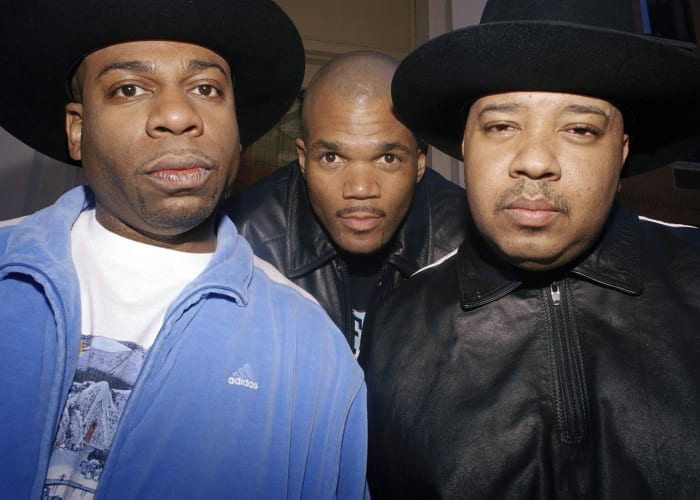For about 15 years, Uriel Rincon told authorities he didn’t recognize the gunman who killed Run-DMC’s Jam Master Jay and wounded Rincon himself in the rap star’s recording studio.
But on Wednesday, Rincon pointed across a Brooklyn federal courtroom and identified Karl Jordan Jr. as the shooter in one of the world’s most infamous killings in hip-hop history. Jordan and Ronald Washington, an accused accomplice, have pleaded not guilty to murder.
Rincon told jurors in the men’s trial that Jam Master Jay, born Jason Mizell, was in his studio’s lounge area on the evening of Oct. 30, 2002, playing a football video game and talking business with him and another aide, when the door opened. In walked Jordan, the rap star’s godson, Rincon said.
“He kind of walked directly to Jay and gave — like, half a handshake, with an arm. And at the same time, that’s when I hear a couple of shots,” Rincon testified. He said he was looking down at his ringing phone as the gunfire erupted, then looked up again.
“And then I see Jay just fall,” he said.
Then, Rincon said, he felt pain in his left leg and realized that he’d been shot and that the 37-year-old hip-hop luminary was gravely wounded.
“I’m trying to tend to my wound, and at the same time, I’m trying to give Jay attention — asking him: Is he OK? Can he talk? Whatever — and he is just not responding,” Rincon testified.
He said that during the shooting, Washington was at the studio door, telling the other aide to get on the ground and stay there. Both suspects fled down a hallway toward the building’s back door and fire escape, he said.
The rap star had a gun, which was sitting by his side on a sofa armrest during the 10-to-15-second encounter, Rincon said.
Rincon, who goes by Tony, was the first eyewitness to testify in the long-awaited trial over the death of Mizell. The DJ helped rap gain a wider audience through his role in Run-DMC, the 1980s powerhouse group that notched the genre’s first gold and platinum albums and was known for such hits as “It’s Tricky” and its take on Aerosmith’s “Walk This Way.”
The trial opened Monday, and on Tuesday, Judge LaShann DeArcy Hall ruled that Jordan’s rap lyrics — which include first-person accounts of violence and drug dealing — can’t be used against him at trial, as prosecutors sought.
Jordan, known as “Little D,” and Washington, who’s nicknamed “Tinard” and was a childhood friend of Mizell’s, were arrested in 2020. Prosecutors say the two had been planning a cocaine deal with the rap star and killed him because they were about to get cut out.
Washington’s lawyers have said authorities had no clue who killed Mizell and that they brought a case held together only with “tape and glue.” Jordan’s attorneys have said he was at his then-girlfriend’s home at the time of the shooting.
While questioning Rincon Wednesday, defense lawyers emphasized that he repeatedly told investigators that he hadn’t quite seen and couldn’t identify the gunman. He maintained the same even while giving the Daily News of New York a 2007 interview.
Rincon said he “omitted the truth” because he was scared for himself and his mother, particularly after — according to him — Jordan approached them at Mizell’s funeral to ask Rincon whether he’d seen the gunman. (He said no.)
Rincon said he also struggled to fathom what had happened.
“I didn’t understand what I saw,” Rincon said, about how someone he knew — and who knew Mizell — could have killed him. “That’s why it was hard for me to grasp.”
He finally named Jordan and Washington to authorities around 2017. At the time, he also told investigators that Mizell had uttered “Oh” and an expletive as the shots were fired.
When asked why he finally did so, Rincon said he thought of Mizell’s surviving family.
“I felt that his wife and his children needed closure, and I felt that they should know what took place,” said Rincon, who gave composed but heavy-hearted testimony, at times speaking softly or taking heavy breaths. Washington, 59, and Jordan, 40, showed no visible emotion as he pointed to them out in court.
Rincon had started doing various tasks at Mizell’s studio at 17 and considered him a music-business mentor. A college student in his mid-20s at the time of the shooting, Rincon sought counseling afterward and moved out of state, he said.
“Are you still scared today?” asked Mark DeMarco, a lawyer for Jordan.
“Of course,” Rincon said.
Copyright 2024 The Associated Press. All rights reserved. This material may not be published, broadcast, rewritten or redistributed without permission.





